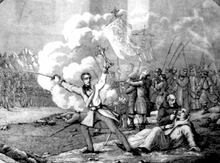Krakow uprising
The Krakow uprising of February 18, 1846 was to become part of a general war for the restoration of the Polish state, along with the uprising in the province of Poznan . However, he remained isolated and was quickly suppressed. It ended with attacks by the rich farmers against the Polish landowners and the annexation of the Republic of Krakow by the Austrian Empire .
prehistory
In the Polish partition areas , new political organizations emerged in the 1840s with the aim of renewing the Polish state. Among them were the “Democratic Society” in Warsaw and the Province of Poznan . The “Plebeian League” around Walenty Stefański was also formed in Poznan . This also radiated to Pomerania and West Prussia .
In the spring of 1845 the Central Committee in Poznan decided to prepare an uprising. The main reason was the fear that political reforms by the partitioning powers could spill Polish identity. It was planned to attack the Prussian and Austrian military stationed there in Poznan and Galicia and to trigger an uprising in the Russian part of Poland . This should turn into a general war. The aim was to rebuild the Polish state within the borders before the Polish partitions . In January 1846 it was decided in Cracow to form a national government headed by Karol Libelt .
The plans did not come to fruition in Prussia because they had been betrayed to the police. The leaders were arrested. In Prussia a trial was being prepared against the insurgents, the so-called Poland trial .
course
The movement was more successful in the semi-autonomous Republic of Krakow . The Austrian officials were forced to flee the city and a Polish national government took control of the republic. This had the support of both the bourgeoisie and the lower classes and from emigration circles. The “Krakow Manifesto”, written by Karol Libelt on February 22, 1846, announced the liberation of the peasants , support for the poor and full equality for Jews .
The Cracow government raised a small army and the peasants were encouraged to revolt. For their part, the Austrians encouraged the peasants in Galicia to resist the Polish landowners (see Galician Peasant Uprising 1846 ), to whom they were in a relationship of hereditary subservience.
The Polish troops were defeated by the Austrians. Jan Tyssowski declared himself dictator on February 24th. He gave up on March 2nd and fled with 1,500 men to Prussian territory, where the Poles were interned. The social revolutionary philosopher Edward Dembowski (1822–1846), who was instrumental in the uprising, died on February 27 in the fight in Podgórze . In western Galicia, numerous manor houses were destroyed and thousands of members of the Polish landlord class were killed. The Austrian army finally put down these unrest as well. The government in Vienna cleverly exploited the social discontent of the rural population against the Polish independence movement.
consequences
As a result of the uprising, the Republic of Krakow was annexed by the Austrian Empire on November 16, 1846 . The “Krakow Manifesto” was of great importance to the Poles, as it was the first time that national and social issues were brought together.
analysis
The historian Pieter M. Judson sees the Cracow uprising with a view to the nationality issue as a sign that the Polish peasantry in the 19th century was hardly susceptible to Polish nationalist agitation: “Polish democrats and the nationally-minded nobility viewed their rebellion as that Attempt to liberate the country from the repressive Austrian imperial state. Galician peasants, however, preferred to submit to the rule of a Habsburg emperor, who stood between them and the whip-wielding tyrannical landowners, than to live in an independent Polish state. There were no feelings of national solidarity. "
literature
- Angelina Gerhardt: The Cracow uprising in 1846 and the peasant uprising in Galicia. In: Riccardo Altieri, Frank Jacob (Hrsg.): Spielball der Mächte. Contributions to Polish history. minifanal, Bonn 2014, pp. 117-139, ISBN 978-3-95421-050-3 .
- Thomas Gerber: The Cracow uprising of 1846 in German poetry. In: Scientific journal of the University of Potsdam. Vol. 35, H. 3, 1991, ISSN 0939-3986 , pp. 229-232.
- Józef Buszko: A little known Polish uprising: The Cracow uprising of 1846. In: Hartmut Kircher, Maria Kłańska (ed.): Literature and politics in the Heine time. The 48 revolution in texts between pre-march and post-march . Böhlau, Cologne et al. 1998, ISBN 3-412-11997-0 , pp. 137-147.
- Manfred Alexander : Small history of Poland. Reclam, Stuttgart 2003, ISBN 3-15-010522-6 , pp. 214f.
- Christian Ortner : The uprising in Cracow and Western Galicia of 1846. In: Heeresgeschichtliches Museum Wien (Ed.): From mercenary armies to UN troops. Armies and wars in Austria and Poland from the 17th to the 20th century. Vienna 2011, ISBN 978-3-902551-22-1 .
Individual evidence
- ^ Pieter M. Judson: Habsburg. History of an Empire 1740-1918 . CH Beck, Munich 2017 ISBN 978-3-406-70653-0 p. 207
